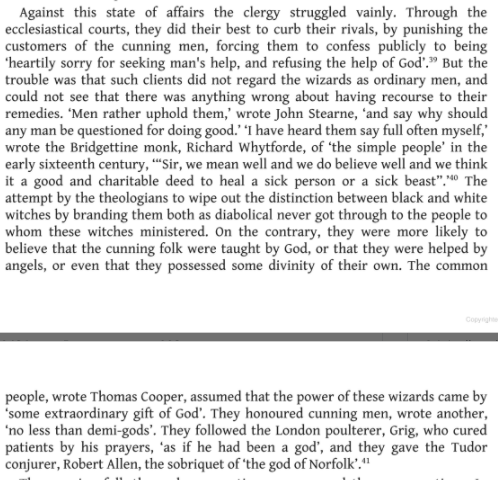Keith Thomas (16th century historian) stated that common people believed folk magic/scryers came from God.
- Type
- Book
- Source
- Keith Thomas Non-LDS
- Hearsay
- Secondary
- Reference
Keith Thomas, Religion and the Decline of Magic (New York: Charles Scribner’s Sons, 1971), 265-266
- Scribe/Publisher
- Charles Scribner
- People
- Keith Thomas
- Audience
- Reading Public
- Transcription
Against this state of affairs the clergy struggled vainly. Through the ecclesiastical courts, they did their best to curb their rivals, by punishing the customers of the cunning men, forcing them to confess publicly to being 'heartily sorry for seeking man's help, and refusing the help of God'. But the trouble was that such clients did not regard the wizards as ordinary men, and could not see that there was anything wrong about having recourse to their remedies. 'Men rather uphold them,' wrote John Stearne, 'and say why should any man be questioned for doing good.' 'I have heard them say full often myself,' wrote the Bridgettine monk, Richard Whytforde, of 'the simple people' in the early sixteenth century, "'Sir, we man well and we do believe well and we think it is a good and charitable deed to heal a sick person or a sick east".' The attempt by the theologians to wipe out the distinction between black and white witches by branding them both as diabolical never got through to the people to whom these witches ministered. On the contrary, they were more likely to believe that the cunning folk were taught by God, or that they were helped by angels, or even that they possessed some divinity of their own. The common people, wrote Thomas Cooper, assumed that the power of these wizards came by 'some extraordinary gift of God'. They honoured cunning men, wrote another, 'no less than demi-gods'. They followed the London poulterer, Grig, who cured patients by his prayers, 'as if he had been a god', and they gave the Tudor conjurer, Robert Allen, the sobriquet of 'the god of Norfolk'.
- Citations in Mormonr Qnas
The B. H. Roberts Foundation is not owned by, operated by, or affiliated with the Church of Jesus Christ of Latter-day Saints.

